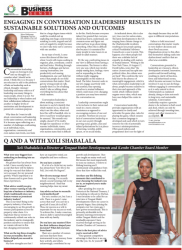
Musa Makhunga, Managing Director - HR Matters (Pty) Ltd : Engaging In Conversation Leadership Results In Sustainable solutions And Outcomes RSS Musa Makhunga, Managing Director - HR Matters (Pty) Ltd : Engaging In Conversation Leadership Results In Sustainable solutions And Outcomes2017-08-25 Conversation leadership keeps on forcing its way into my thoughts as I consider what I should write about. I think this is so because I am reluctant to add to the plethora of fads on leadership such as ethical, thought, visionary leadership and many others as if leadership was many things to many people, when it is not. For me leadership is when leaders and their collaborators influence one another to higher levels of motivation and development in pursuit of a common purpose.
Why then do I want to talk about conversation and leadership in the same sentence, one may ask. It is because upon reflecting on a number of challenges confronting us at individual, team, organisation, community and even nation state levels, one finds that to a large degree issues which could be avoided end up exploding into huge controversies resulting in strife, anguish and all sorts of negativity, simply because we don't take time out to converse with one another. In my type of work, I come across this almost all the time when I work with teams seeking to organise, plan, coordinate, control and lead better. Working through barriers, challenges and factors causing frustrations, low productivity and causing misalignment, one can’t help but notice that people do not hold conversations that matter. Don't get me wrong people do talk, actually there is a lot of talking which I take as talking about everything but less about that which matters. Conversation leadership is about making a conscious decision to say let’s identify that which matters to us, decide on why it not the other, when and how this will be handled, who to drive it and how would progress be assessed. This sounds very simple, doesn't it? In reality though for expediency or other reasons individuals, teams, organisations, communities, and even nation states find it difficult to do this. Partly because everyone takes it for granted that everyone should just know, understand, use common sense and figure out what and how to go about doing something. Often this is difficult also because it is unnatural for many people to raise issues in an adult-to-adult manner. By the way, confronting issues in my view is different from having a conversation. The former is often very one way, which may involve simply stating facts, feelings, views and or responding to these without really engaging meaningfully on the matter at hand. The latter, however seeks to say let’s engage assertively with one another, thus opening ourselves to mutual influence which could mean even changing a position you may have entered the conversation on. Leadership conversations ought to be inclusive in their nature and result in a more cohesive coexistence as opposed to encouraging enclaves of one sort or another. Nowhere do you see lack of conversation leadership as in our own society through growing racial, gender, class and related polarisations be it at places of learning, worship, public spaces, or on social media. As indicated above, this is also very true even for nation states. The latest developments in the US ranging from climate change to the Charlottesville incidents resulting in key people quiting critical Presidential Advisory Councils are a case in point. This happens a lot where people feel there was a definite lack of empathy in dealing with matters of mutual interest. Writing in the New York Times, 19 August 17, David Gelles, notes that “the nation (American) has split into political tribes, the culture wars are backâ€. This confirms the view held that in the absence of meaningful engagement, which is what conversation leadership is all about, people become exclusive in their view and approach of the world, which without doubt negates every value, which may have once helped the centre to hold. Conversation leadership provides organisations with an opportunity to clarify and articulate the game plan, rules for playing the game, which ensures that a common language is developed and used which in turn removes the risk of potentially incorrect misinterpretations. Often good policies and programmes don't see the light of day simply because they are left open to different interpretations. Failure to hold structured conversations that matter results in very shallow decisions and short-lived successes. Organisations prone to this often find themselves sliding easily into dysfunctional conflicts that are otherwise avoidable. Conversations grounded in leadership are visionary, ethical, development oriented, innovative, positive and forward looking resulting in clarity of function, form and behavioural norms, which become sacrosanct to those involved. It easy to just do things without engaging in conversations as it is only natural to do so. Unfortunately as explained already, doing so does not result in long term, and sustainable solutions. Conversation Leadership requires a genuine desire to be inclusive in both word and deed, which can only be achieved through investing time, energy and other resources to accomplish. T: 083 2516704 musa@hrmatters.co.za www.hrmatters.co.za |
Musa Makhunga, Managing Director - HR Matters (Pty) Ltd : Engaging In Conversation Leadership Results In Sustainable solutions And Outcomes
Copyright © 2024 KwaZulu-Natal Top Business